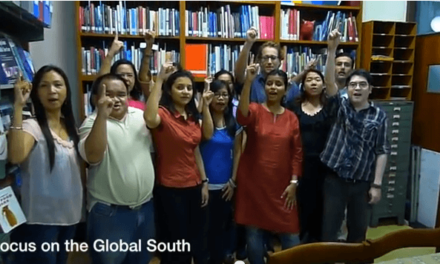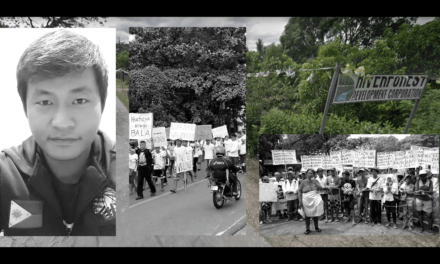




Marching under the banner “Tapat na solusyon, Hindi Tapal na solusyon” [True solutions, not band-aid solution] in the occasion of the World Water Day on March 22, 2019, the Philippine Movement for Climate Justice (PMCJ)–together with its member organizations affected by the water shortage in Metro Manila and the indigenous peoples who will be affected by the construction of the proposed Kaliwa Dam–demands the Metropolitan Waterworks and Sewerage System (MWSS) and the government to provide sustainable and real solutions to the current water problem.
“Hindi pa rin sapat ang dumadaloy na tubig dito sa Metro Manila, pagkatapos mag-utos si Pangulong Duterte na lutasin sa loob ng 150 days ang problema sa tubig, marami pa rin sa Metro Manila ay walang tubig. Sa Quezon City nga, sa bandang Tandang Sora, may mga komunidad pa rin na tingi-tingi ang pagdaloy ng tubig. Malapit na nga ang Tandang Sora sa La Mesa Dam pero, anyare Digong? Nagbabayad kami ng mahal sa Manila Water para lang sa serbisyong palpak,” quotes Ka Pedring Fardigon, the National President of Kongreso ng Pagkakaisa ng Maralitang Lungsod (KPML). [There still isn’t enough water flowing into Metro Manila, even after President Duterte ordered to solve it within 150 days. Many areas in Metro Manila still do not have water. In Tandang Sora, Quezon City, water is still coming in trickles. Tandang Sora is near La Mesa Dam–so what happened, Digong? We are paying Manila Water a lot of money for terrible services.]
Three days ago, the President gave a 150-day ultimatum to MWSS to resolve the water problem. But according to Ka Pedring, the order has not really solved the issue as shown in the case of Barangay Tandang Sora in Quezon City.
“Sa problema ng mga mamamayan, tapal lang ang kaya ng gobyerno na ito. Akala ko ba para sa mamamayan at mahihirap ang gobyerno? Wala pa ring pagbabago,” adds Ka Pedring. [When it concerns the people’s problems, the government can only offer patchwork. They say that this government is pro-people and pro-poor. There is still no change.]
Proposed Kaliwa Dam is not the solution
Members of the Dumagat-Remontado indigenous peoples in the towns of Nakar, Infanta, Real, and Tanay also joined the march, strongly demanding MWSS and the government to stop the planned construction of the Kaliwa Dam. MWSS has said that the water problem in Metro Manila could have been prevented if the said dam was built earlier earlier. However, the Indigenous Peoples who will be directly affected by its construction say otherwise.
“Matagal na kami nagsasabi na ayaw namin ng dam. Sisirain nito ang mga kabundukan ng Sierra Madre, kung saan ito ang aming tahanan at buhay. Libo-libong mga mamamayan sa loob ng apat na bayan ay maaapektuhan, maliban pa rito ang idudulot nitong kasiraan sa aming kapaligiran. Hindi kami tutol sa pag-unlad, pero paano naman kung ang pag-unlad na gusto ng gobyerno ay pagkasira ng aming tirahan, ng ating kalikasan? Sino naman ang makikinabang rito?” stresses Marcelino Tena, the President of the IP organization Sagibin. [We have long expressed our opposition to the dam because it will destroy the Sierra Madre mountain range, which is our home and our life. Thousands of people from these four towns will be directly affected, apart from the environmental damage it will cause. We are not against development, but the government is pushing for development that will destroy our communities and our environment. Who will benefit from this project.]
Marcelino has spent most of his life fighting against the construction of dams and destructive projects in the Sierra Madre mountains. His organization, Sagibin, is at the forefront in the struggle against the construction of the Centennial Kaliwa Dam Water Source Project, a China-funded mega-roject already given the go-signal by President Duterte.
The Pambansang Kilusan ng mga Samahan ng Magsasaka (PAKISAMA) farmer’s federation, on the other hand, fears that their current situation will only get worse as soon as the construction of the dam starts. “Ngayon pa nga lang na hindi pa naitatayo ang dam ay nahihirapan na kaming mga magsasaka, lalo na sa patubig, dahil sa papatinding epekto ng El Niño sa aming pananim. Hindi naman natugunan ng Department of Agriculture iyong mga programa sa agrikultura at patubig, bagkus ay binukas pa ng Pangulo sa liberalization ang mahalaga naming produkto na bigas. Seryeng pasanin na ito sa aming magbubukid. Lahat na ng polisiya at programa ay hindi tumatapat sa aming pangangailangan. Tapos magtatayo pa ng Kaliwa Dam na aagaw pa sa aming pinagkukunang tubig para sa irigasyon. Dapat sana sustenable at tunay na solusyon ang ipinagkakaloob ng gobyernong ito.” [Even before this dam is built, farmers are already suffering from irrigation water shortage from intensifying effects of El Niño on our crops. The Department of Agriculture’s irrigation and agriculture program has failed. Instead, the President has liberalized ride trade. Our burdens as peasants are piling up. None of the government programs and policies serve our needs. And now, the Kaliwa Dam project will be build to steal our water resources. What we need are real and sustainable solutions from government.’
Water problem in Metro Manila, not an isolated case
The Philippine Movement for Climate Justice (PMCJ) points out that water shortages are also being felt in various parts of the country, not just in Metro Manila. Zamboanga City, for example, now in a much worse situation due to El Niño, from poor water supply due to watershed destruction and development projects.
“The current water problem in the country, exacerbated by the dry spell, is just a preview of an impending large-scale water crisis. This is not impossible to happen under climate change. In fact, international scientists have already warned us of the possible scenarios if the world failed to limit its global warming to 1.5 degree Celsius by 2030. As it is now, our own government is lacking in terms of understanding and taking actions to mitigate and adapt to climate change,” emphasized Ian Rivera, the National Coordinator of PMCJ. “We fear that if the government continuously ignores the horrors of climate change, another bloody event will occur, the same as what happened three years ago in Kidapawan massacre, a climate-induced crisis.”
Meanwhile, political party Partido Lakas ng Masa‘s (PLM) Sonny Melencio calls on the government to reverse all the policies that aggravate the lives and miseries of the people. “What should have been done in the final analysis are policies that matter to everyone—policies that should work for the people and not just for the elite few. It is the mission of PLM to bring into public discourse that wrong policies are due to having a wrong government. We have a government that only serves the interest of the big businesses and few families. This is why problems like water services, electricity prices, rice liberalization, development projects such as Kaliwa Dam, hunger, and impacts on drought are never solved. We should resist these policies. We should advance solutions that will work for the people and solve the persisting problems of hunger, joblessness, poverty, political exclusion, and at the same time strive to widen the social base of economic development. We believe that with this present government, these policies that we want can never be achieved. We should place genuine political parties in the government, political parties that are truly accountable to the people,” he said.
Press release from Philippine Movement for Climate Justice (PMCJ)
[All photos by Galileo de Guzman Castillo]








